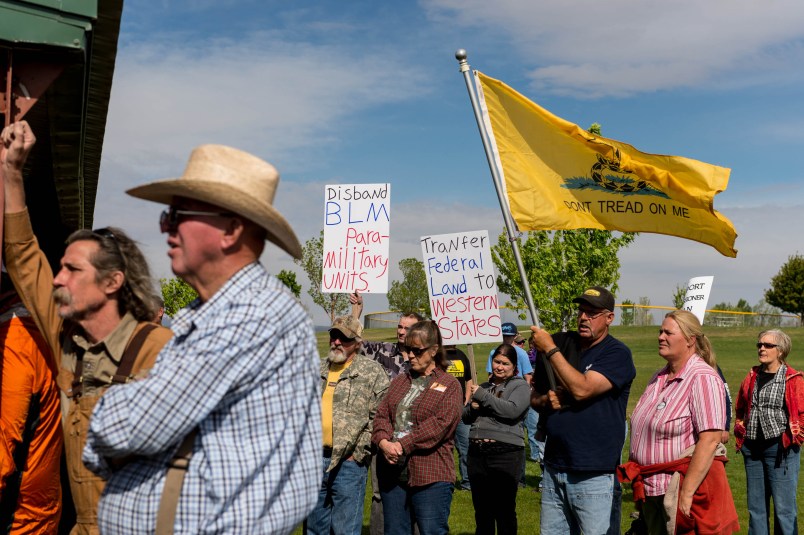SALT LAKE CITY (AP) — The federal government controls two-thirds of the land in Utah and the state says it’s prepared fight to get it back.
A Republican-dominated commission of Utah legislators voted Wednesday to move forward with a lawsuit challenging the U.S. government’s control of federal lands — the latest salvo in a long-running feud.
The commission made the decision after a consulting team it hired said its research concluded the Constitution does not give the U.S. government power to control federal lands within state borders.
The team of hired lawyers recommended the commission urge the governor and attorney general to take on the lawsuit, even while warning it could cost up to $14 million, take years to play out in the courts and saying it would be far from a sure victory.
“It’s a solid argument but the court has never thought about it before,” said Ronald Rotunda, a constitutional law expert part of the team of lawyers. “That’s what makes it a very dramatic case.”
The only votes against moving forward came from two Democrats, who objected to the costs and questioned the objectively of the consulting team.
The decision marks the latest indication that Utah’s conservative leadership remains committed to moving forward with what many consider a longshot attempt to assert state powers.
Utah passed a law in 2012 demanding the federal government hand over the lands by the end of 2014. When that deadline quietly passed, Utah legislators began weighing a possible lawsuit. Supporters of the plan argue that the state would be a better managers of the land and that local control would a allow Utah to make money from taxes and development rights on those acres.
Lawmakers backing the proposal hit on those topics Wednesday in explaining their votes.
Rep. Keven Stratton, R-Orem, chair of a commission for the stewardship of public lands, said the decision was made after years of careful consideration and countless stories from residents in rural counties about how federal management makes living and doing business on federal lands cumbersome and unpleasant.
“We want things that we treasure cared for not only for our day, but for the generations to come,” Stratton said. “We have a record in this state that shows that we can manage and care for the treasures we all value.”
The office of Utah Attorney General Sean Reyes will make a final decision on the lawsuit. His chief of staff, Parker Douglas, said they will review the consultant’s voluminous report and do their own analysis before making any decision.
“There’s arguably a case,” Douglas said, adding the attorney general’s office “is not a rubber stamp. . . . We will look at it and we will consider it.”
The state has paid the consultants $502,000 so far, and is authorized to pay up $2 million to prepare a legal strategy and sway public opinion in the state’s favor.
Department of Interior Secretary Sally Jewell considers Utah’s push a misguided effort that doesn’t take into account benefits or costs of managing public lands, agency spokeswoman Jessica Kershaw in a statement. “The Secretary has been clear on this issue — she’s happy to have thoughtful discussion about achieving balanced managements – but she’s not open to selling off public lands to the highest bidder,” the statement reads.
Sen. Jim Dabakis, D-Salt Lake City, voiced his lingering skepticism about the objectivity of the firm’s research and questioned why the state is spending money for what he said most legal scholars consider a legal Hail Mary at best. He said the hired lawyers have the same ideological bent as Utah’s GOP-dominated legislature.
“It’s a little bit like asking a barber, ‘Do I need a haircut?'” Dabakis said.
Rep. Joel Briscoe, D-Salt Lake City, said he opposed the plan because he needs more time to assess whether the lawsuit is worth $14 million of taxpayer money, a cost estimate he called stunning.
The two Democrats are joined by a long list of environmental groups in opposing the plan. The Center for Western Priorities said in a statement that Utah is wasting money to have hired guns give them the answers they want to hear.
The consulting team and the commission defended the work, saying they researched and analyzed counter points.
“I asked: If there are warts, we want to see them,” Stratton said. “If there’s a pile of horsepucky, if we’re barking up the wrong tree, we want to see that.”
Copyright 2015 The Associated Press. All rights reserved. This material may not be published, broadcast, rewritten or redistributed.







So according to their crack legal team, the States have the right to just grab all federal lands? OK … how about military bases?
This is dumb. It’s a waste of taxpayer money and court time. Utah will lose.
By that logic, just the one sentence, they want to say that the federal government can control nothing inside of a state. Meaning they control nothing except maybe federal buildings? I just do not get that logic. I do sort of get them being annoyed with so much land they cannot use, I understand that, but pending the protection status of it, it may be best to see if a buy back of some of the lands would be in order.
Not sure what research they did but this sort of thing generally seems to be within federal power to do. I mean the Constitution itself says they can have land.
They didn’t like it so much when W was prez, but now are really fight’n mad enough to spend millions because of the blah’ man.
Nice. The idiots have taken over another state.